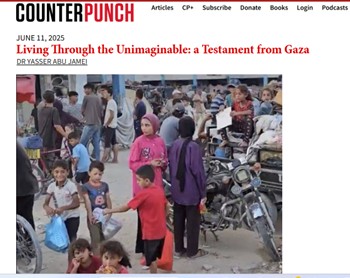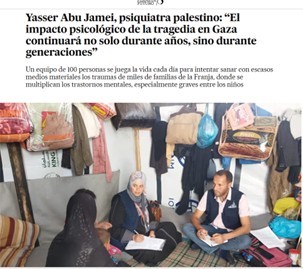
“Workshop: World Mental Health Day – Leave No-One Behind”
Gaza Community Mental Health Programme has concluded its mental health campaign, organized on the occasion of World Mental Health Day, by a workshop that it has held on the 13 of October 23, 2022. The workshop carried the title, “leave no-one behind”, connoting the inclusive principle of service delivery that GCMHP adopts.
Attended by 137 participants from local and international organizations active in mental health and human rights, the workshop included a winner announcement ceremony of the short film contest that GCMHP organized as part of its mental health campaign.
The first session of the workshop was designed to cast light on the mental health state in the Gaza Strip considering the context of uncertainty and violence. A panel of mental health specialists presented papers and studies on the reality of different social categories, especially the elderly and vulnerable groups and how their psychological wellbeing is affected by the situation, providing recommendations to be adopted by the community and the stakeholders in order to lead to improving their mental health reality.
Speaking as a panelist, Dr Yasser Abu Jamei, Director General of GCMHP, presented statistics about the mental health state under the occurrence of multiple emergency situations, including the recurring military offensives against and the spread of Covid-19.
The workshop was concluded by presenting the recommendations and announcing the names of the three winners in the short film contest.
Recommendations:
· Initiating a joint action by various components of the society in a way that enhances the principle of “leave no one behind” as one of the sustainable goals of development, and in a way that represents a real commitment to eradicating poverty in all its forms, put an end to discrimination and exclusion, and reduce inequalities and vulnerabilities that lead to leaving People behind while undermine their potentials.
· Promoting multisectoral strategies that should ensure universal access to mental health services.
· Promoting mental health of children and adolescents as a priority through the enactment of laws that reinforce and protect their mental health, and also through the support of caregivers for children and adolescents.
· Promoting mental health services that are integrated into health care and social services, as well as in other contexts such as school health, child protection, disability and correction and rehabilitation centres.
· Enhancing mental health programmes for people with disabilities and the elderly so that their psychological needs can be comprehensively met through high-quality and accessible services.




Read Comments
Steven Rich
March 10, 2019Omnis iste natus error sit voluptatem accusantium nam libero tempore, cum soluta nobis est eligendi optiocumque nihil impedit quo minus id quod maxime.
Van Wimbilton
March 10, 2019Natus error sit voluptatem accusantium nam libero tempore, cum soluta nobis eligendi optio cumque nihil impedit quo minus id quod maxime.